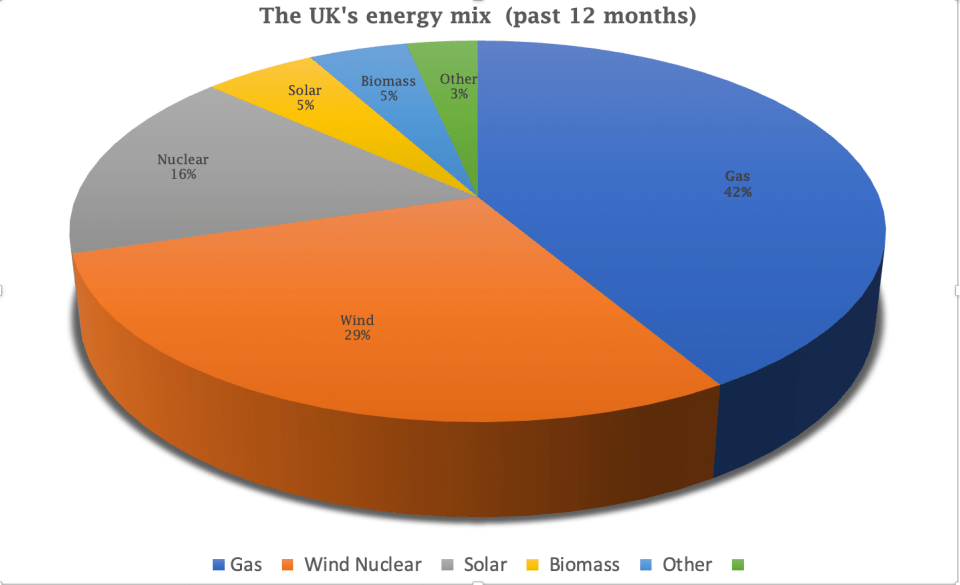UK faces supply crunch as gas and nuclear power plants close, warns Drax as it halts key biomass project

The UK is facing a significant shortage in power that can be brought online at times of peak demand, warned Drax, raising the risk of supply crunches and blackouts.
The power group has released a report it commissioned from Baringa Partners, warning that the UK’s dispatchable capacity is set to decline from 93 per cent 85 per cent by 2027.
This is due to the retirement of inefficient fossil-fuel plants and nuclear reactors alongside a rise in demand because of electrification.
Overall, Baringa has calculated that peak demand for electricity will increase by 4GW over the next four years.
However, the imminent closure of coal, older gas generation and nuclear power stations will remove up to 6.3GW of secure capacity from the grid.
This will put more strain on the UK’s energy network and increase the importance of the Drax Power Station – with the UK scrambling to avoid blackouts this winter amid a Russian supply squeeze on the continent.
The government is targeting a vast ramp-up in green energy over the coming decades, with the UK set to see a 25 gigawatt increase in intermittent renewable power capacity.
However, it will still need stable generation as backup – such as gas, nuclear or Drax’s biomass facilities, which burn imported wood pellets to generate energy in massive boilers.
Drax released the report as the company announced it has halted plants to invest hundreds of millions of pounds into its bioenergy carbon capture and storage (BECCS) project at its flagship power station, until the development is fast-tracked for approval by the government.
The energy giant has told the government its BECCS project needs to gain track one status – meaning it is green-lit in the current approval round for carbon projects – for Drax Power Station to remain financially viable beyond 2027, risking its closure.

Drax has been pushing to make its biomass generation carbon negative by capturing and burying the emissions under the North Sea in depleted oil and gas fields – which it has estimated will cost £2bn, consisting of a blend of private investment and taxpayer subsidies.
Drax Power Station was originally a coal-fired power plant but the company has converted four of the six units to burn biomass wood pellets, which qualify for renewable energy subsidies.
It received £617m last year, while the two remaining coal units have been kept open as emergency backup – but are now due to close this month.
However, the company is facing a ticking clock for subsidies, which end in 2027 – and it is increasingly uncertain whether wholesale electricity prices will be high enough for Drax to cover its input costs and maintain operations without more money from taxpayers.
Drax has received £6bn in green energy subsidies from British taxpayers over the last four-decades, and was the latest energy giant to announce bumper profits of £731m last year.
Biomass a key feature of UK’s energy mix
The UK is highly dependent on biomass energy – which is generated through burning imported wood pellets – to meet its energy security needs.
At times with the tightest margins, Drax’s biomass units provide up to 11 per cent of total UK electricity generation.
It is also classed as renewable power when burning younger, less carbon intense trees – making up 12 per cent of the UK’s green energy mix in conventional conditions, and up to 70 per cent of the UK’s renewable generation when wind and solar generation declines.
Generating energy through biomass is highly controversial, with Drax accused in a BBC Panorama documentary of cutting down older, carbon rich trees in Canada – a claim Drax denies.
Drax chief executive Will Gardiner was supportive of the government’s announced £20bn investment plans into carbon capture and storage but argued the company needed a firm commitment before investing billions of pounds into the project.
He said: “Until we have this clarity, we are pausing our multi-million pound investment programme in the UK BECCS project and urge the government to use the planned announcement at the end of the month to outline their support for this. Any further delays to this project could impact the UK’s security of supply, net zero and levelling-up ambitions and the viability of Drax Power Station.”
Downing Street has been grappling with hesitancy across the UK energy sector, with Enquest, Harbour Energy and Total all pulling out of projects in the North Sea – while the renewable industry has warned not enough has been done to revive the onshore wind industry.
The government has been approached for comment.